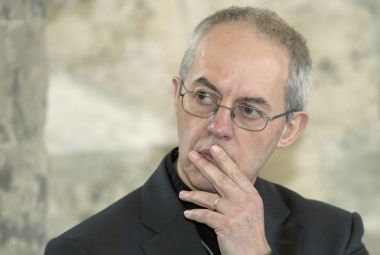Dean of St Paul's: Anglicans need each other despite deep split over homosexuality

The Anglican Communion Primates' meeting – over 30 Archbishops meeting in private from 10th January in Canterbury – has hanging on it the hopes and fears of millions of Anglicans around the world. And the key question is whether, with their divergent views about human sexuality, they can find a way to be reconciled and to live together in one communion – or not.
I think there are two vital underlying issues which will determine what the outcome of all this is going to be.
The first is whether doctrine or people come first. Those in favour of same-sex relationships major on people and their experience, with an emphasis on love, which they then bring to their interpretation of the scriptures; those who are opposed begin with the question of truth, and deduce from the scriptures how people ought to live. Both those who affirm same-sex relationships and those who disagree with them have important perspectives to bring, but both run the risk of accusing the other of not being a 'real Christian', losing touch with pastoral care and compassion.
The Church is not a body defined by rules and dogmas, but a fellowship of diverse people joined together by faithfulness to following Jesus Christ. It will not stay together where principle – whether for or against – becomes more important than our shared bond in the Body of Christ. You can see this when conservatives assume lesbian, gay or transgender church members (and those who accept them) are not properly Christian at all, and when those in favour of gay relationships regard those opposed as uncompassionate and un-Christian. The challenge for the Archbishops is to encompass in themselves our human diversity in Christ and allow that God is big enough to cope with the diversity which we find uncomfortable and hard to comprehend.
The other, even more vital, issue is that of how we deal with difference. The sexuality divide focuses the big question facing the whole of humanity, which underlies other huge topics the Primates are dealing with (religious persecution, the safeguarding of the vulnerable, people trafficking, the treatment of refugees). How do we treat people who are different from us? The forces of Daesh in Syria seek to eradicate difference and make everyone else like them, through violence and the threat of death; extremist political parties see immigrants as a threat; leaders make themselves lifelong rulers by destroying those opposed to their control of power.
Will the threatened splits and walk-outs happen – or can the Primates model something different? Does the truth belong to one side, are there two incompatible truths – or are we servants of one God with something to learn from each other in order to become the one Body of Christ in love?
My hope is that the Primates will offer not only the Church but also the whole world the real Christian hope of how we can live together in difference without destroying the other. That means accepting that none of us own the full truth, and that we find God's truth through being committed to live in relationship with one another.
My fear is that they will follow the world rather than Christ, and give up on one another.
May God help our Archbishops, and us: and may we in our own lives and prayers work to love those who are different from us, and love those who find it hard to love us.
The Very Revd Dr David Ison is the Dean of St Paul's.











